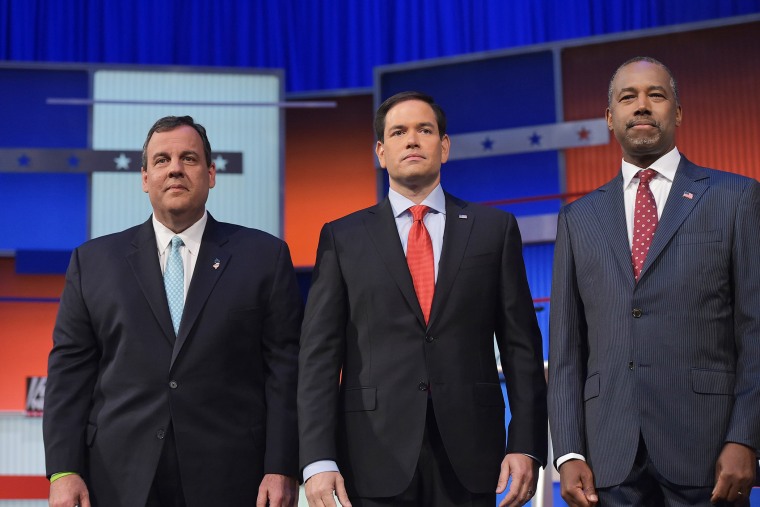Languishing at the bottom in polls of the Republican presidential field, Gov. Chris Christie of New Jersey ramped up his tough talk on foreign policy on Monday, calling President Obama a “weakling” and saying that the United States should threaten to shoot down Russian planes conducting airstrikes in Syria. “My first phone call would be to Vladimir, and I’d say, ‘Listen, we’re enforcing this no-fly zone,'” Mr. Christie said on MSNBC. “And I mean we’re enforcing it against anyone, including you. So don’t try me. Don’t try me. Because I’ll do it.” [...] In a separate interview on Fox News, Mr. Christie said the United States faced a choice between letting Russia try to reconstitute the Soviet Union by expanding its influence in the Middle East or engaging in a military confrontation. Asked whether he thought it was wise to engage in a military conflict with Russia if it breached such an American no-fly zone, Mr. Christie said it would be necessary.
Republican candidates eye dangerous Russian confrontation
It's a little alarming to see Republican presidential candidates who have a cavalier attitude towards the start of World War III.

When it comes to President Obama's policy in Syria, the Washington Post's Dan Drezner, a center-right scholar of international affairs, is generally unimpressed. Drezner explained yesterday, however, that the administration's policy has "one virtue" in its favor.
"The president has determined that Syria is not a core American interest and therefore does not warrant greater investments of American resources," the Tufts professor said. "It’s a cold, calculating, semi-competent strategy. But it has the virtue of being better than the suggested hawkish alternatives."
And speaking of hawkish alternatives, let's consider the latest rhetoric from the most scandal-plagued candidate in the Republican presidential field, who apparently is looking for some attention.
During the Fox News appearance, Christie said of Russian warplanes, “You take him down," according to the New York Times' account.
This comes on the heels of Sen. Marco Rubio (R-Fla.) also raising the prospect of shooting down Russian jets over the skies of Syria, inviting a U.S./Russia hot war. Asked what a Rubio administration would do if Putin's forces entered a no-fly zone, the far-right senator responded, "Well, then you’re going to have a problem. But that would be no different than any other adversary."
When I've argued in recent years that the Republican Party needs a clearer, well-defined foreign policy, I didn't mean GOP presidential candidates who have a cavalier attitude about the start of World War III.
I realize, of course, that there are prominent voices in both parties who've raised the prospect of a no-fly zone over Syria, and it's a policy that should be subjected to a spirited debate. That said, we don't see Democrats right now thumping their chests about shooting Russian planes out of the sky and treating nuclear rivals like "any other adversary."
At a certain level, the reckless posturing, if nothing else, should bring the debate into sharper focus. On the one hand, Americans see President Obama, who's willing to rid the Assad regime of its chemical-weapons program and launch air strikes against ISIS targets, but who does not believe the outcome of the Syrian civil war as a core American national-security interest.
And on the other hand, the public sees his would-be Republican successors, who feel so strongly about the Syrian civil war that they'd create the conditions for a hot war against a major nuclear power.
Which approach do Americans prefer?
As for Christie's childish rhetoric about President Obama being a "weakling," in my experience, there's an enormous difference between those who talk tough and those who are tough. Folks who go around boasting to anyone who'll listen about how incredibly strong they are, and about how impressed they are with their own toughness, those are the people who usually crumble first when the pressure is on.
It's those with the quiet confidence and inner-strength who don't need to boast because they already know how to keep a level head and show grace under fire.